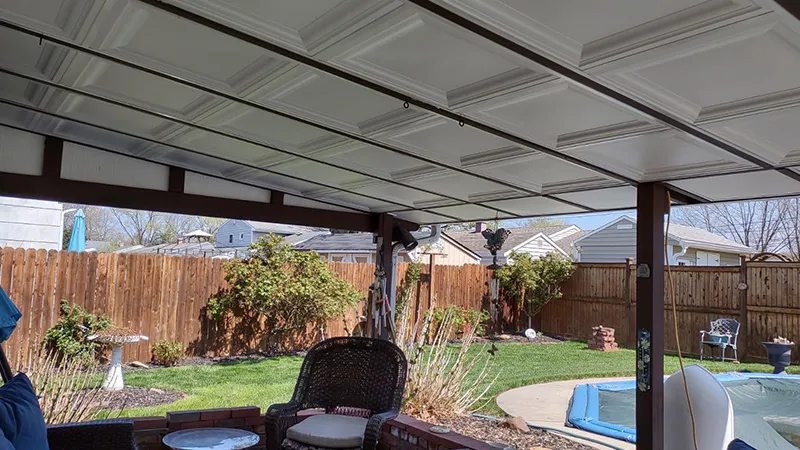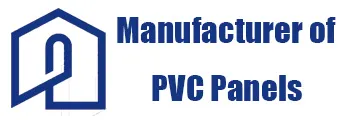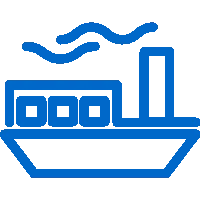What Materials Can Be Used for Garage Walls?
Your garage is more than just a place to park your car. It’s a workshop, storage area, and sometimes even a hangout. Having walls that can meet the needs of these different uses is essential. Traditional drywall, while common, falls short in terms of durability and functionality.
Think about it, moisture damage, dents from tools, and wear and tear can all take their toll. So, what’s the solution? Let’s take a deep dive into some quality alternatives that can upgrade your garage walls.

I. PVC Panels
Polyvinyl chloride or PVC panels are made from rigid PVC (vinyl) sheets extruded into flat sheets. They are lightweight, durable, and moisture-resistant, making them a popular choice for garage walls.
PVC or polyvinyl chloride panels are a great option for homeowners who want to install a simple drywall in their garage. PVC panels interlock for easy installation, and slatted panels can be integrated into the design to create areas for hanging tools or recreational equipment. They are available in a variety of colors and are insect and moisture resistant. To clean them, you can wipe them with soap and water or even rinse them with high-pressure water.
– Advantages
1. Durability and longevity
Once installed, drywall can easily become damaged, forcing you to fill holes or cracks over time. With PVC wall panel, you’ll never have to worry about damage. PVC wall panel is scratch, dent and impact resistant, making it ideal for withstanding the wear and tear of a busy garage environment, ensuring your walls remain in great condition for years to come. Additionally, PVC wall panel resists pests such as termites and ants, reducing the risk of pest infestation in your garage.
2. Easy to install
PVC wall panels weigh 40% less than drywall and can be installed four times faster thanks to their pre-punched screws and tongue-and-groove interlocking system, with no special skills or tools required. This means you can skip time-consuming activities like mud, tape, primer, and paint, completing your project faster.
3. Moisture-resistant
Unlike traditional drywall, PVC wall and ceiling panels are non-porous and 100% waterproof. They never absorb water, making them resistant to mold and mildew. This makes them particularly suitable for use in garages, which can occasionally experience high humidity levels from spills or moisture.
4. Low Maintenance
PVC wall panel requires minimal maintenance to keep it looking its best. They are pre-finished, so they don’t need to be painted, stained, or sealed, and they are easy to clean. PVC wall panel can also be easily wiped down with soap and water, common household cleaners, or even a pressure washer. This makes it a worry-free choice for homeowners who want to spend less time on maintenance.
– Disadvantages
1. Low heat resistance
2. May release chlorine gas
3. Poor impact resistance
Best for: Homeowners who want a low-maintenance alternative to drywall
II. Plywood or Oriented Strand Board (OSB)
Drywall can cost between $1.50 and $3 per square foot, but plywood is an affordable alternative to drywall that is also durable, especially if it is sealed after installation. It is available in a variety of thicknesses and materials, so you can make the best choice for your space and budget.
While you may often hear the terms plywood and OSB used interchangeably, they are two very different products with different advantages and disadvantages. Plywood is made from long pieces of wood veneer that are cross-laminated and glued together to create a smooth surface and durable panel.
Engineered wood products like plywood and oriented strand board (OSB) are frequently utilized in DIY and building projects. Plywood is made from thin sheets of wood with each layer of wood grain perpendicular to the grain of the previous layer, glued together. OSB is made from layers of compressed wood strips oriented in a specific direction and bonded together with adhesives, and it is a more cost-effective alternative to plywood.
Plywood and OSB offer several advantages that make them suitable choices for garage walls:
– Advantages
1. Strength and durability
Relatively robust materials that can survive the rigors of a garage environment are OSB and plywood. They are less susceptible to dents and damage from impacts than drywall, making them a resilient choice for walls that may be struck by tools or equipment.
2. Moisture resistance
While neither plywood nor OSB are completely waterproof, they are more resistant to moisture than traditional drywall and can withstand occasional wet conditions when properly sealed and maintained.
3. Versatility
Because OSB and plywood are such adaptable materials, homeowners can paint, stain, or leave them untreated to create the exact look they want for their garage.
4. Easy installation
Both plywood and OSB are relatively easy to install. They can be cut to size with standard carpentry tools and then nailed or screwed directly to wall studs or existing drywall. However, if you plan to paint or stain the boards, you will have to add to the installation time.
5. Cost-effectiveness
Plywood and OSB are generally more affordable than other wall materials, such as fiber cement board or metal sheeting, making them an affordable option for homeowners who want to upgrade their garage walls without spending too much money.
– Disadvantages
1. May delaminate in humid climates
2. Releases formaldehyde
3. Requires sealing
Best for: Garages that need an affordable alternative to drywall
Oriented Strand Board
Oriented Strand Board (OSB) is made from small pieces of wood and an adhesive that bonds them into sheets. The sheets are then cross-layered for added strength. OSB is cheaper than plywood, and you can paint it to match your garage design or seal it to keep out moisture. As an alternative to drywall, it is impact-resistant and won’t stain or discolor as easily as drywall.
– Advantages
1. Cheaper than plywood
2. Won’t delaminate
3. Sustainable
– Disadvantages
1. May swell when exposed to moisture
2. Rough appearance
3. Requires sealing
Best for: Practical garages on a smaller budget
III. Metal Panels
Metal panels are usually made of steel or aluminum and are flat sheets of metal. Metal panels come in a variety of shapes, including corrugated, ribbed, or flat, and have a variety of surface treatments, such as painted, galvanized, or coated.
Metal roof panels cost more than other materials, but you can install them on your garage walls for a low-maintenance and durable interior. These panels are lightweight, but be careful with sharp edges when installing them. They are also moisture and insect resistant, and you can install them directly on studs or over other sheathing materials like plywood.
Metal panels come in a variety of styles. Basic corrugated metal is formed into valley ridges to create a wavy look. Ribbed metal roofs have protruding ribs that are spaced at regular intervals and overlap during installation to create a better seal. Standing seam metal panels are the most expensive type, but they have a more modern look and hidden fasteners.
Metal panels have several advantages over drywall for garage walls:
– Advantages
1. Durability and strength
Metal panels are extremely durable and resistant to dents, scratches, and corrosion. They can withstand the wear and tear of a busy garage environment, making them a durable choice for walls that may be hit by tools, equipment, or vehicles.
2. Moisture resistance
Metal panels are moisture resistant and will not deform when exposed to water or high humidity. However, the panels are susceptible to condensation, which can lead to moisture problems and mold growth behind the panels if not properly insulated and ventilated.
3. Easy to install
Metal panels are relatively simple to install, especially for homeowners with basic carpentry skills. They can be cut to size using standard metal cutting tools and then fastened directly to a stud or existing wall using screws or nails. Some metal panels even come with interlocking edges for a seamless and waterproof installation.
4. Low maintenance
Metal panels require minimal maintenance to look their best. They are less susceptible to fading, chipping, and rusting, so you won’t need to repaint or refinish as often as other materials. An occasional wash with soap and water is usually enough to remove dirt and grime.
5. Aesthetic appeal
The sleek, industrial appeal of metal panels might improve your garage’s overall appearance. Because they are available in an array of hues and textures, you may tailor the appearance of your walls to your personal aesthetic tastes.
Disadvantages
1. May rust if metal is exposed
2. More expensive than other materials
3. Can have exposed fasteners
Best for: Homeowners who want an easy-to-clean and durable material
IV. Fiber Cement Board
Fiber cement board is a composite material made of cellulose fibers, sand, and cement. Typically, wood pulp is the source of these fibers, which give the board its strength and light weight. Pressed into flat sheets, the mixture can be used to wallboard, roofing, siding, and other building uses.
This durable material is a good alternative to drywall because it is moisture-resistant and low-maintenance. Fiber cement is versatile, it can be smooth, textured, or formed into designs that mimic wood or stone, and it comes in a variety of colors.
While fiber cement boards are not necessarily difficult to install, they are heavier than other materials. Since they are brittle, they can crack if not handled properly. They also create dust when cut, so wearing proper protective gear is essential.
Fiber cement boards are a great option for garage walls because of their many benefits:
– Advantages
1. Durability
Fiber cement boards are very durable and resistant to impact damage, making them well suited to the harsh environment of a garage. It can withstand accidental knocks from tools or equipment without dents or punctures, ensuring your walls retain their appearance for the long term.
2. Moisture resistance
Unlike drywall, fiber cement board is moisture resistant and will not swell or warp in the presence of high humidity or occasional contact with water. This makes it a great choice for garages where moisture may be a concern, helping to prevent mold growth.
3. Pest resistance
The cement component of fiber cement board makes it less attractive to pests such as termites and ants, reducing the likelihood of a garage being infested by pests. By doing this, homeowners may avoid the inconvenience and cost of having to deal with pest damage or treatment.
4. Low maintenance
Fiber cement board requires minimal maintenance to keep looking its best. It resists fading, chipping, and cracking, so you won’t need to repaint or repair as often as other materials.
5. Aesthetic options
Fiber cement board comes in a variety of textures and finishes, allowing you to customize the look of your garage. Whether you prefer a sleek modern finish or a textured look that mimics wood or stone, there is a fiber cement board option to suit your design preferences.
Cutting and installing fiber cement boards often requires specialized tools, such as carbide saw blades and scissors, which you may not have in your toolbox. Additionally, cutting or drilling fiber cement boards creates a lot of dust and debris that can be harmful if inhaled. It is crucial to use goggles and a dust mask as well as other appropriate safety measures when working with this material.
– Advantages
1. A variety of styles and colors
2. Moisture and fire resistant
3. Low maintenance
– Disadvantages
1. More expensive to install
2. May mold if exposed to moisture
3. Heavier than other materials
Best for: Garages with a wood or stone exterior
V. Conclusion
Choosing the right material for your garage walls can make a world of difference in durability, functionality, and aesthetics. Whether you choose fiber cement boards, plywood, sheet metal, or PVC siding, each option has unique benefits that can enhance your garage space. Thus, take into account your unique requirements and preferences and create a decision that will last over time. Your garage deserves walls that work with your lifestyle!









